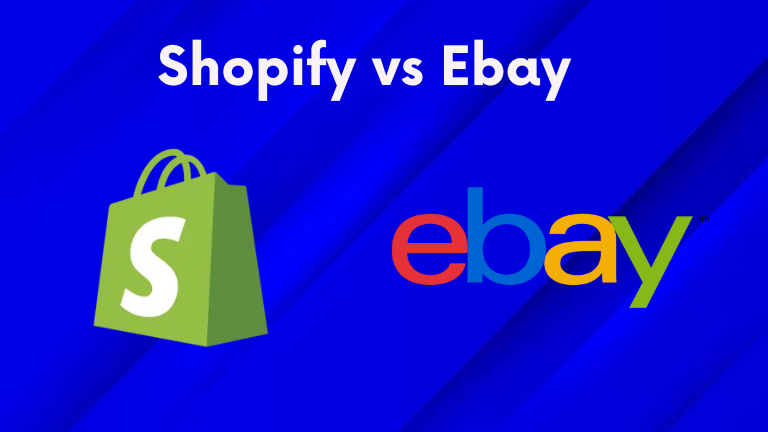
Choosing the right e-commerce platform is critical for the success of your online business. With many options available, finding the platform that best suits your needs can be challenging. Two popular choices among entrepreneurs are ClickFunnels vs Shopify. While both platforms offer unique features and benefits, understanding their differences is essential for making an informed decision.
This blog post ClickFunnels vs Shopify aims to provide a comprehensive comparison between ClickFunnels and Shopify, highlighting their strengths and weaknesses. Whether you’re just starting out or looking to switch platforms, this guide will help you decide which option is the best fit for your business.
What is ClickFunnels?
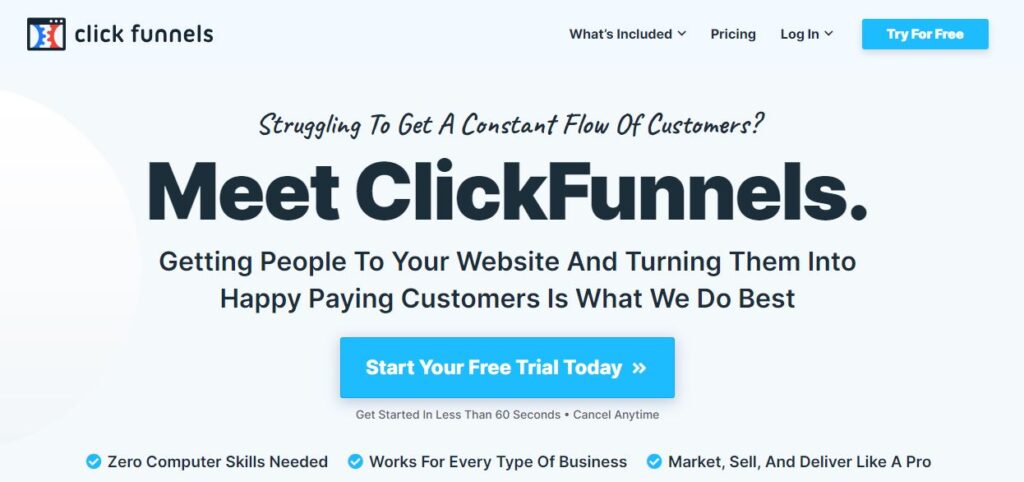
ClickFunnels is an all-in-one sales funnel builder designed to simplify creating and managing marketing funnels. It helps businesses automate their sales processes with tools for building landing pages, managing email marketing, and handling sales transactions. Key features include:
- Drag-and-Drop Funnel Builder: Easily create custom sales funnels without needing coding skills.
- Pre-Built Funnel Templates: Access a library of templates designed for various business goals, such as lead generation, sales, and event promotion.
- Email Marketing Automation: Integrate email campaigns within your funnels to nurture leads and convert them into customers.
- A/B Testing: Optimize your funnels by testing different versions and identifying the most effective elements.
- Analytics and Reporting: Track the performance of your funnels with detailed analytics to make data-driven decisions.
Ideal Use Cases
ClickFunnels is particularly beneficial for businesses focused on direct sales and lead generation. It’s ideal for:
- Online Marketers: Those looking to create high-converting sales funnels to maximize revenue.
- Course Creators and Coaches: Professionals who want to sell digital products or services through automated funnels.
- Small Business Owners: Entrepreneurs who need a straightforward solution for driving online sales without extensive technical expertise.
Pricing Structure
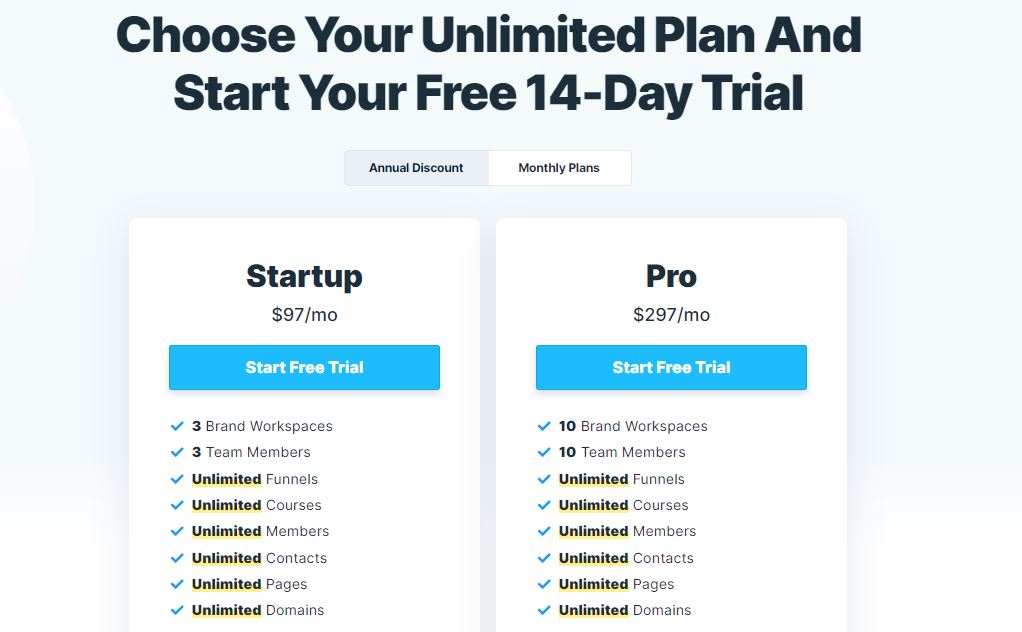
ClickFunnels offers 2 pricing plans to accommodate different business needs:
- Startup Plan: $97 per month, includes essential funnel-building features, email marketing, and more.
- Pro Plan: $297 per month, offers additional features such as priority support and advanced funnel capabilities.
What is Shopify?
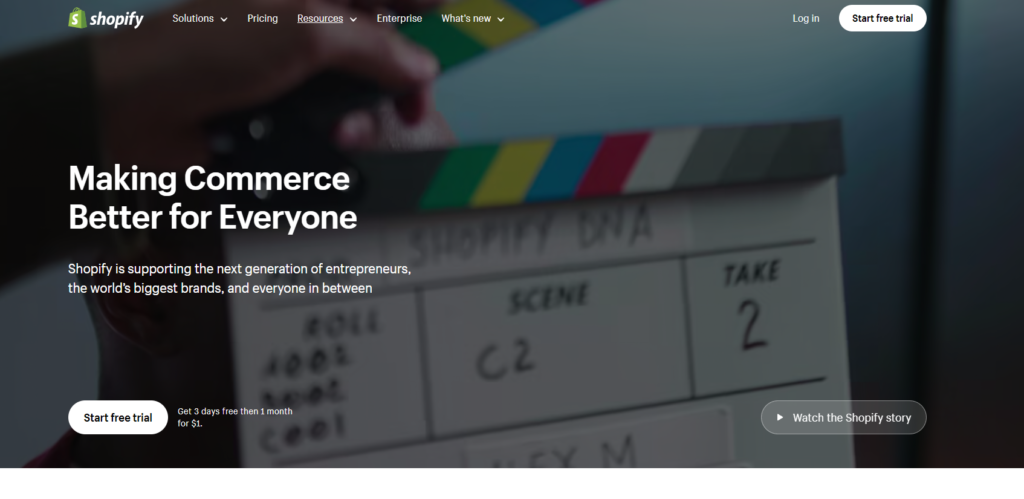
Shopify is an e-commerce platform that empowers businesses to create and manage online stores. It provides a comprehensive suite of tools for selling products, processing payments, and managing inventory. Key features include:
- Customizable Online Store: Create a fully functional online store with customizable templates and themes.
- Integrated Payment Processing: Accept payments through various methods, including credit cards, PayPal, and other options.
- Inventory Management: Track and manage your inventory with ease, including product variations and stock levels.
- Sales Channels Integration: Sell on multiple platforms, such as Facebook, Instagram, Amazon, and eBay, all from a single dashboard.
- Built-in SEO and Marketing Tools: Improve your store’s visibility with SEO apps and marketing apps like email campaigns and discount codes.
- Extensive App Store: Enhance your store’s functionality with a wide range of apps and integrations available in the Shopify App Store.
Ideal Use Cases
Shopify is an excellent choice for businesses of all sizes looking to establish an online presence. It’s ideal for:
- Retail Businesses: Traditional brick-and-mortar stores looking to expand their reach online.
- Small and Medium-Sized Enterprises (SMEs): Businesses seeking a scalable platform that grows with their needs.
- Dropshippers: Entrepreneurs who want to run a dropshipping business with ease, thanks to Shopify’s seamless integration with dropshipping apps like Oberlo.
- D2C Brands: Direct-to-consumer brands aiming to build a strong online presence and manage all sales channels in one place.
Pricing Structure
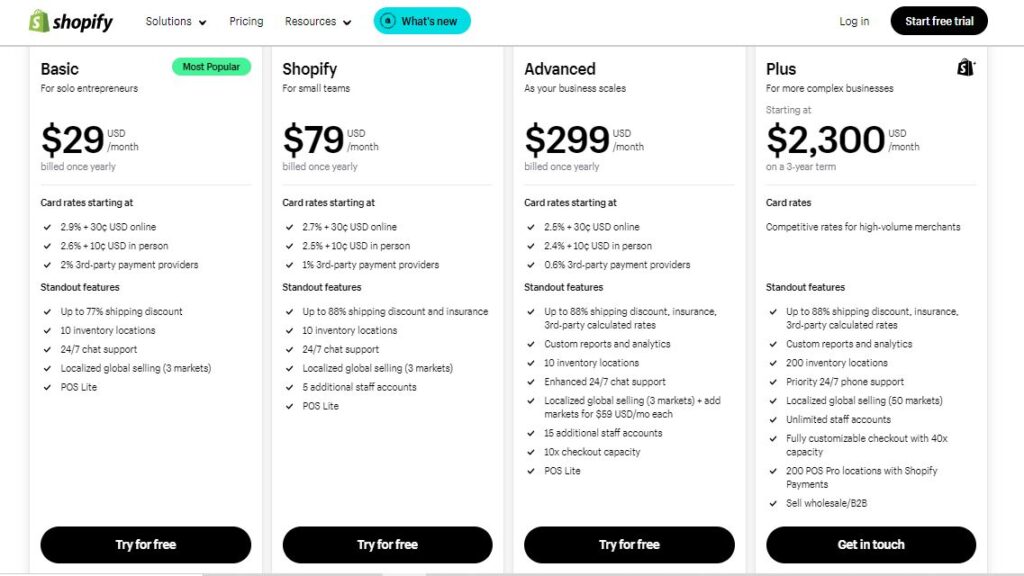
Shopify offers several pricing plans to suit various business needs and budgets:
- Basic Shopify: $24 per month, including all the essentials for starting a new business.
- Shopify: $69 per month, provides additional features such as professional reports and more staff accounts.
- Advanced Shopify: $299 per month, offers advanced features like custom reports and third-party calculated shipping rates.
- Plus: $2,300 per month, offers complex advanced features like Unlimited staff accounts, Sell wholesale/B2B, and 24/7 phone support.

ClickFunnels Vs Shopify: Features Comparison
When it comes to choosing the right platform for your online business, the decision often boils down to ClickFunnels vs. Shopify. Both are powerful tools, but they serve different purposes and offer unique advantages. Let’s dive into the key differences between ClickFunnels vs Shopify, focusing on ease of use and setup, customization and design flexibility, sales and marketing tools, payment processing and fees, and customer support and resources.
Ease of Use and Setup
ClickFunnels: ClickFunnels is designed with simplicity in mind, making it a breeze for beginners and non-experts to set up and manage their online business. The platform provides pre-designed sales funnel templates that guide users step-by-step through the setup process. This approach ensures even those with minimal technical experience can create effective sales funnels quickly.
Shopify: Shopify, while user-friendly, offers a more comprehensive range of features and customization options, which can be overwhelming for some users. However, its drag-and-drop website builder and intuitive interface make it accessible for entrepreneurs with varying levels of technical expertise. Shopify also provides a wealth of online tutorials and a supportive community to help users get started.
Tip: For those who are just starting and want a straightforward setup, ClickFunnels might be the better choice. However, if you’re looking for a more robust platform with extensive customization options, Shopify is worth the initial learning curve.
Customization and Design Flexibility
ClickFunnels: ClickFunnels focuses on creating effective sales funnels with minimal customization. While it offers a variety of templates for different types of funnels (e.g., product launches, webinars, and membership sites), the customization options are somewhat limited compared to Shopify. However, this simplicity can be advantageous for users who want to launch quickly without getting bogged down in design details.
Shopify: Shopify shines in its customization and design flexibility. With a vast library of free and paid themes, users can create a unique online store that reflects their brand. The platform allows extensive customization through its drag-and-drop builder, and tech-savvy users can further tailor their site using CSS and HTML. Shopify also supports blogging and content management, adding to its versatility.
Tip: If you prioritize having a highly customized and visually unique online store, Shopify is the clear winner. ClickFunnels is ideal for users who prefer a more streamlined approach focused on conversion.
Sales and Marketing Tools
ClickFunnels: ClickFunnels excels in sales and marketing automation. It offers a comprehensive suite of tools designed to maximize conversions, including ready-made sales funnels, email marketing automation, CRM integration, and affiliate management. ClickFunnels also provides features like upsells, order bumps, and abandoned cart recovery to boost sales.
Shopify: Shopify provides robust sales and marketing tools tailored for e-commerce. Its strengths lie in its seamless integration with social media platforms and advertising tools, enabling businesses to drive traffic to their stores effectively. Shopify also supports a wide range of apps for additional marketing functionalities, such as email marketing, SEO, and customer reviews.
Tip: For businesses focused on sales funnel optimization and marketing automation, ClickFunnels offers specialized tools to drive conversions. Shopify is ideal for those looking to leverage social media and advertising to grow their online store.
Payment Processing and Fees
ClickFunnels: ClickFunnels integrates with popular payment gateways like PayPal and Stripe, allowing users to process payments directly through their sales funnels. While this flexibility is beneficial, it’s worth noting that ClickFunnels does not have its payment processing system, potentially leading to higher fees depending on the chosen gateway.
Shopify: Shopify offers its own payment processing system, Shopify Payments, which simplifies the payment process and reduces transaction fees. It also integrates with over 100 payment gateways, giving users the flexibility to choose the best option for their business. However, using third-party processors incurs additional fees.
Tip: Shopify’s integrated payment processing and reduced fees make it an attractive option for businesses handling high transaction volumes. ClickFunnels provides flexibility in payment gateway choices but may involve higher fees.
Customer Support and Resources
ClickFunnels: ClickFunnels provides 24/7 customer support through live chat and email, ensuring users receive assistance whenever they need it. The platform also offers a comprehensive knowledge base and community forum for troubleshooting and learning.
Shopify: Shopify excels in customer support, offering 24/7 assistance through live chat, email, and phone. The platform’s extensive knowledge base, online tutorials, and active community forums provide ample resources for users. Shopify’s commitment to customer service makes it a reliable choice for businesses of all sizes.
Tip: Shopify’s robust customer support and extensive resources give it an edge in this category. ClickFunnels also provides solid support, but Shopify’s multi-channel support options and quicker response times can be more reassuring for users.
Which Platform is Best for You?
Both ClickFunnels and Shopify are excellent platforms to build your website, depending on your store goals. Each has specific use cases that make it attractive to certain types of entrepreneurs.
ClickFunnels is best for:
- Entrepreneurs aim to craft a sales pitch for a product or service that includes the capability to upsell and cross-sell. Each product uses its own funnel.
Shopify is best for:
- Entrepreneurs who want to build a complete store or product pages. It comes complete with a shopping cart and credit card processor, making it a one-stop shop for many e-commerce stores.

Ultimately, your choice between ClickFunnels and Shopify should be based on your business needs and the type of shopping experience you want to provide to your customers.
Can I use ClickFunnels with Shopify?
Yes, you can integrate ClickFunnels with Shopify to create sales funnels for specific products or services while using Shopify for your main e-commerce storefront.
Which platform is better for digital products?
ClickFunnels is often preferred for digital products due to its focused funnel approach, whereas Shopify supports a wide range of products including physical goods and digital downloads.


